Remote Learning Initiatives in Maharashtra
Remote Learning Initiatives in Maharashtra
- Development of the Learning Continuity Plan
- The Learning from Home Package
- DIKSHA Abhyasmala Campaign
- Initiatives Undertaken by Balbharti
- Online Capacity Building Initiatives
- Story of the Day
- TV Programme
- Radio Programmes
- Bookyboo
- Career Portal for guidance in careers
- Webinars for capacity building of Education Functionaries
- Dissmeination of the Package & Mentoring
- Aspects covered in the webinars series so far
- Data on Reach
- Preparation for the new Academinc calendar
- Guidelines and Checklist for School Opening
Development of the Learning Continuity Plan
In the present situation of school closure and limited physical movement, the Department of School Education, GoM, with technical support from UNICEF, has developed a 3 phased Learning Continuity Plan to ensure continuity in learning for all children grades 1-12. The Department is aware that many of the planned activities may also be suitable for children from ages 3 to 6 years. With the usual norm of more than one child per family, the activities can be used by the parents for their younger children as well. Hence, the Learning from Home strategy adopts a Life Cycle Approach (pre-primary to grade 12)}. The phases take into consideration continued learning in the period of school holidays, delayed school opening post June 2020, and the period of school opening. This is a dynamic document and will evolve with time and better understanding of how COVID is impacting lives.
The Learning from Home Package
The Learning from Home Package developed as part of the plan is a set of educational interventions available on different technology platforms, such as TV, Mobile phone, and Internet which is shared daily with parents and children through an SMS or WhatsApp message. These different modalities were selected based on the varying access of families to these technologies depending on their location and financial status. The approach is inclusive in that it provides all children, even the most vulnerable, access to some educational content, during this time of school closure. The package was coordinated through the technical support of UNICEF and partners with whom this content was available – Pratham Books, GaliGaliSimSim, Diksha, etc.
The Home Learning Package for these grades for phase 1 includes the following elements-
DIKSHA Abhyasmala Campaign
In order to ensure students’ continue their learning, MSCERT in collaboration with Leadership for Equity started the Abhyasmala campaign on 13th April 2020. The aim of Abhyasmala campaign is to provide students with academic as well as co-curricular content. DIKSHA core teams (content and outreach) are established at state level that coordinate the work of Abhyasmala. Daily a whatsapp message containing links of digital content is shared by the SCERT director with students through officers and teacher networks.
The Abhyasmala campaign is divided into three phases:
- 13th April to 26th April: Academic content for AY 2019-20.
- 27th April to 14th June: Co-curricular, activity based content, content for 10th standard students, content for students appearing for 5th and 8th standard scholarship examination.
- 15th June onwards: Academic content for AY 2020-21
Around 29500 academic and co-curricular content pieces are available on DIKSHA-Maharashtra through contribution of teachers and content partner organisations. Since Abhyasmala started, the content on DIKSHA has been played for 2.18 crore times in Maharashtra.
Since the campaign has started a total of 22 lakh students and teachers have used the content circulated via DIKSHA. Out of these, 16.94 lakh were students from grade 1 to 10. Snapshot of content usage as reported from DIKSHA backend is as follows:
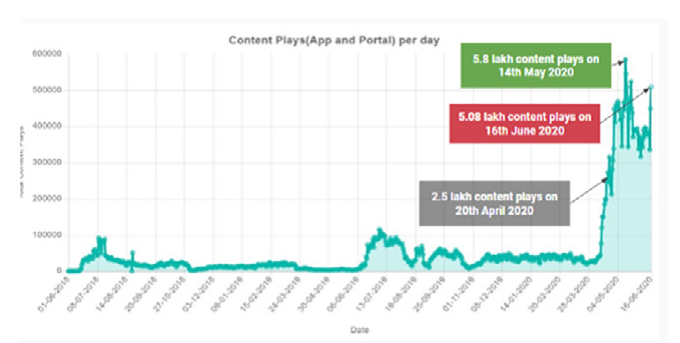
DIKSHA Scholarship Campaign
Scholarship exams in Maharashtra are conducted for grades 5th and 8th. Through the Scholarship campaign, preparation material in the form of videos, practice questions and worksheets were shared with the students. The campaign was done specifically for Marathi medium covering the subjects of English, Mathematics and Marathi. The content is available in both online and offline. 13,113 content plays (number of times content is played) was recorded through the campaign.
Initiatives Undertaken by Balbharti
E-learning app for 10th Standard
An e- learning app was created by Balbharti for the 10th standard. Content on the app is available for the students of Hindi and Marathi medium. Content of the app is available in both online and offline mode which can be accessed using both the mobile app and desktop app. The app has a diversity of content available on the platform which includes: explanation videos, practice questions, assessments, E-Textbook PDFs, lesson plans, slides, recorded classrooms. Currently, there are 46,425 users on the platform.
BolklBalbharti Audio book
The objective of the project is to provide audiobooks for subjects in English and Marathi medium for the students of classes 8,9 and 10th. This content can be accessed using the Bolki app and on the desktop app. Currently there are 22,200 users of this app. The content on the app is available in both online and offline mode.
E-Balbharti channel
In order to provide a learning platform for the students, Balbharti started a YouTube channel. The channel has explanation video content available for students from Grade 5 to 10th. The channel provides content to the students and teachers in English, Marathi, Hindi, Gujrati, Telugu, Urdu, Sindhi, and Kannada medium. Since the content is available on the YouTube platform, content can be accessed on both mobile devices and desktops. Currently, there are 39,50,386 users of the platform.
E-books
The objective of this initiative is to make the curriculum textbooks available in PDF format for students of all grades in all mediums of the Maharashtra Board. The e-books are available for all the students from grade 1 to grade 12. The Maharashtra board covers 10 mediums of delivery for the students. The platform provides books for all the mediums. Currently, 10,25,000 users have accessed the books on the platform. One can visit this website to access the books: ebalbharati
Virtual Classrooms
The idea of starting Virtual classrooms was on the objective to reach out to students in schools where teachers are not available. The pilot of this project has been conducted for the Grades of 9th and 10th in Marathi medium. The Virtual classrooms covered the subjects of Mathematics, English and Marathi. The lessons were delivered with the help of devices which were installed already in the classrooms in specific schools. These live classrooms are available only in the online mode and this initiative was tried out with 6,400 students.
Learning Outcomes Smart Q Mobile App
The objectives of the initiative are:
- Provide opportunity to the Students to solve the Lo based questions.
- Analysis of the performance of the students according to the LO.
- 100% students will achieve 75% in every LO.
Students from primary and middle school were provided with NAS level Questions for practice in individual LOs. The students and teachers can access these questions using the app available on Play Store. It was developed and implemented by DIET Amravati for the students in the district. They have reached out to 7,67,837 users.
Teaching and learning from Home (RAA Amravati)
The objectives of the initiative are:
- Since school education is not possible, use of digital platforms can help in continuing the teaching learning process for the students
- To motivate teachers to teach students by using online resources.
The content is available for Primary, Middle, Secondary and Higher Secondary levels. The e-resources were created for the students with the help of DET faculty. Students were provided with the resources over WhatsApp as a medium of communication. The teachers are being trained in subject pedagogy to deliver online teaching with the help of Zoom. Under the leadership of DIET, Amravati 916 teachers from Amravati district planned for online education of 92,560 students. Content created in this initiative is available in both online and offline manner.
Online Capacity Building Initiatives
To build the capacity of teachers & officers in Maharashtra state following initiatives were undertaken by Maharashtra SCERT.
BRp Program
To strengthen the outreach of DIKSHA Content and increase usage of DIKSHA App, we aim to train BRPs in the districts. The mode of training was offline.BRPs were trained on how to use technology in the classroom with focus on integration of DIKSHA app in the classroom. This was a zero budget initiative. To monitor and evaluate the training feedback forms were collected from all the BRPs through google forms. In the coming year we plan to train all the BRPs in all 36 districts of Maharashtra.
Remedlal Program
To create resources which will be useful for the secondary students who need added support and direction, remedial videos were created. Teachers were trained in-person as well as virtual meetings to create these types of resources. Content specifically targeting the learning outcomes that need to be improved in the state and for students who need remedial content were selected for the program. Budget for this activity was allocated from SamagraShiksha. In the coming year we plan to train the same group of teachers to keep creating high quality content.
Cyber Security
To ensure higher secondary teachers and students are aware and can protect themselves from cybercrimes (phishing, bullying, etc.), a module was created by SCERT. Budget for this activity came from SamagraShiksha. Post-tests of students and teachers were planned to monitor the usefulness of the module. The module was circulated through hard copy and soft copy forms.
Avirat Teacher Training (Level 3)
To prepare selected teachers to become master trainers Avirat level training was conducted by the state. As part of this, online teacher training was conducted by the ShyamchiAai Foundation. The app was created - mahacareermitraapp.
Spoken English MOOC
Objectives of Spoken English MOOC are as follows :
- To equip the last teacher of English to enable the last student to speak English confidently.
- To enable primary school teachers of English to speak English confidently.
- To give chance to teachers to learn English with their own pace, time and interest.
- To meet expectations by the NCERT in speaking skills, articulated in the Learning Outcomest
The Spoken English MOOC is a Blended Learning Model. It is a blend of Face-to-Face training & online learning forming a Blended learning model for ‘Teachers Professional Development’. The training module developed for the Spoken English face to face training was converted into an online module. In the making of this online course script writing, storyboarding, video shooting & editing was done. The Online Spoken English blended model has three phases. Phase-1 starts with MOOC Orientation meeting, Baseline one & Confidence survey, Course consumption, Mid phase assessment, MOOC meeting one, Classroom execution, Pre webinar survey, and Webinar one in it. Then phase two and three are similar to phase one. At the end certificates are available to download. In the COVID-19 lockdown situation the inputs planned for face-to-face delivery are being delivered through webinars.
Budget for this activity came through SamagraShiksha. Total 19297 teachers enrolled in the MOOC, out of which 15317 completed the MOOC training. After the successful piloting of Spoken English MOOC 499 Mentors across the state were trained as MOOC mentors at State level in three batches. MOOC Mentors conduct a monthly MOOC meeting with 25 teachers from their cluster. MOOC mentor support and monitor the progress of Teachers. FGDs are conducted with the teachers and MOOC mentors. The performance is tracked through online consumption and tests. In the coming year, Regional Academic Authority, English Expertise, Aurangabad is planning to develop Advanced Spoken English MOOC.
Samarth Prototype Program
A strengthened cadre of academic and administrative officers working across state, district and urban education departments with improved skills to design and lead effective programs and drive effective people management structures, Samarth Program was introduced. The core values of the program are collective learning through peers and use of technology to improve effectiveness of people and programs.
In this program, SCERT’s continuous professional development department in partnership with Leadership For Equity (LFE) conducted an extensive need analysis, based on it State decided to Develop/Design content on conducting effective online sessions. Course mainly helps officers to understand the topic and also how a particular topic can be implemented or used in their day to day life. Course contains many real life examples and its solutions, case studies, reflective questions and many videos to understand the content. This prototype course was intended to develop the understanding on how States can develop high quality courses, and stages of course creation. With the help of this, Now Samarth program has developed 3 other courses on Team Management, Monitoring and Evaluation and Effective online course creation. To track success of the program Number of minutes spent on the platform by each user were measured, completion rate was also measured. In the coming year, we aim to selecting the group of 400+ Academic and Administrative officers from state (SCERT, RAA, DIETs and ZPs), Officers consuming the course, Implementation of PLC batches, Capstone project and Gathering the learning for further expansion of the project.
Virtual Professional Development Forums
Virtual Professional development forums started as a response to the COVID 19 crisis with the intent to ensure a continuous learning platform for officers across Maharashtra. The platform enabled administrative & academic officers and teachers across the state to interact with eminent personalities across education, business, sports, theatre, politics, and many more directly. The platform has sessions in workshop and webinar mode to accommodate many officers across the state. Some targeted VPDFs were also conducted with different DIET’s to enhance knowledge of officers on program design and evaluation. It was completely online, ZOOM application was used to deliver these trainings. Education experts, health practitioners, poets, authors, political and administrative leaders have conducted virtual sessions for officers. Net promoter score, online surveys, digital poll during and after the training were conducted in order to check the usefulness of these sessions.
Story of the Day
Apart from those stories that can be accessed through DIKSHA, Pratham’s ‘Missed Call Do AurKahaniSuno’number is also shared with parents (through teachers) so that children can access the service. The toll-free number can be dialed by Parents who will then receive a call with an audio story. A set of generic activities are shared with the parents via SMS daily that can be done by the children after listening to the stories.
TV Programme
Currently Galli Gallo SimSim is being aired by DD Sahyadri at 10am from Monday to Friday. The programme is suitable for young children (pre-primary to grade 2) and is being watched by over 11 lakh children in the state.
Radio Programmes
A set of educational games and activities are also being broadcast through radio in one region of the state by Pratham in partnership with MSCERT. The MSCERT is considering taking the program across the state.
Bookyboo
A storybook for children on COVID has been adapted with WHO messages and has been developed in Hindi, English and Marathi, and in AV format for wider dissemination. This has been launched by the MSCERT in partnership with UNICEF.
Career Portal for guidance in careers
This portal was launched by the Education Minister for students of grades 9-12 so that they can explore the wide menu of career paths available and to serve as a guide to navigate through the multiple ways of achieving their aspirations. Further, it will become a powerful tool in the hands of the over 400 counsellors in the state who play a critical role in mentoring students. Over 5000 education functionaries participated in the launch.
Webinars for capacity building of Education Functionaries
5 webinars were conducted with education functionaries on different topics (given below) to build their capacity and enable them to facilitate the reach of the Learning from Home package to teachers, and parents. There was overwhelming attendance in these webinars with around 3900 participants in each one.
The following two visuals give, in brief, an outline of the Home Learning Package for each age-group, with the implementation modalities. Some of Package elements are already launched, while others will be launched soon.
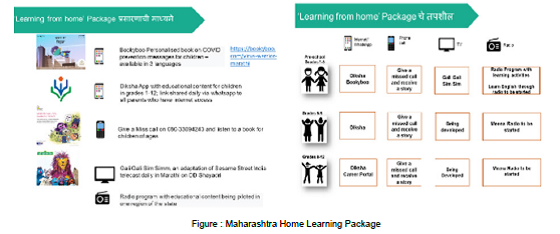
Dissmeination of the Package & Mentoring
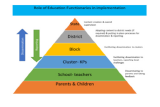 The success of the Learn from Home Strategy is based on two things- the awareness and support provided to parents to cope with the situation of being at home, and on the awareness and use of the Home Learning Package. To address the above, first, the communication channel through WhatsApp groups was activated so that information reached over 700,000 education functionaries and teachers through the cascade approach.
The success of the Learn from Home Strategy is based on two things- the awareness and support provided to parents to cope with the situation of being at home, and on the awareness and use of the Home Learning Package. To address the above, first, the communication channel through WhatsApp groups was activated so that information reached over 700,000 education functionaries and teachers through the cascade approach.
State-------District-----Block-----Cluster Leaders----Teachers-----Parents & Children
Next, GoMin partnership with UNICEF, adapted the leadership program to motivate the network of educational officers to disseminate the package to all parents and children in the state. In particular, it was thought very critical to strengthen the cluster leaders, who lead 15-20 schools, and mentor the teachers of these schools. In the current times, the skill building program was adapted to address using the skills of data management, action plan development to support teachers to reach parents and children with key messages – on COVID prevention and learning continuity. To date, 5 webinars have been completed with the leadership cadres with an average participation of 3900 officers in each webinar. Cluster leaders are motivated by the webinar series and many are submitting stories for the COVID diaries which will be published soon.
Aspects covered in the webinars series so far
Collecting and analysing data on mode of access by different students in their cluster; developing an action plan for their cluster of schools to ensure better implementation of the Learning from Home program and tracking of progress; importance of parent engagement in promoting learning from home.
A special session on caring for self and addressing the psycho-social needs of children during the pandemic and lockdown has been taken care of. A resource person from TISS – iCALL online psycho-social care programme and helpline conducted the session
Dissemination of key information on cyber-security, and WASH messages, etc. as they pertain to learning from home using technology, and also adequate preparation for reopening of schools taking care of sanitation, water, and hygiene.
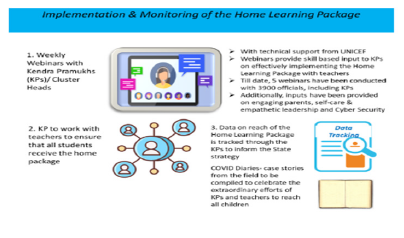
Data on Reach
The table below provides data on reach using the different interventions that are part of the Learning from Home package:
Tracking reach of Learning from Home Package
| Platform/Programme | Modality | Target Audience (Children) | Total Numbers reached as of reporting date | Date of reporting |
| Diksha | Grades 1-12 | May 20th data: 5,83,984 | 3-Jun | |
| GaliGaliSimSim (start date 20thApril 2020) | TV | Children 3-8 Years | 1,117,000 or 1.12 Million kids, 2-14 yrs. | 20th Apr’20 –22nd May’20 |
| Pratham Books – Missed Call Do KahaaniSuno (start date 22nd April 2020) | Give missed call on 080330 94243 from any mobile phone (basic or feature orsmart phone) and even a landline phone | Ages 0-14 Years | Number of Calls from MH : 119k | 1-Jun |
| Number of listeners [Children] MH :45K | ||||
| Number of stories listened to in MH :112K | ||||
| Tot. num. of minutes consumed by MH state:250k | ||||
| Pratham Radio (1st May 2020) | Radio | Children 3-10 years | 3,99,430 | 11-Jun-20 |
| Bookyboo Books (14th May launch ) | Internet | Children 3-10 years | 97,648 downloads | 4-Jun-20 |
| Webinars with Education Functionaries covering a variety of topics | Webinar | Education Functionaries | 3900 in each of 5 webinars | 30-May-20 |
| Career Portal | Online | grades 9-12 | accessed by over 2000 students | 6-Jun-20 |
Preparation for the new Academinc calendar
Academic Learning Calendar
In order to ensure students and teachers are able to access chapter wise learning resources and activities, the MSCERT has undertaken the task of preparing an academic learning calendar for grade 1 to grade 10. The calendar will comprise quarterly plans for each subject of grade 1 to grade 10. For the first quarter from June to August 2020; month wise chapters to be covered and links of digital resources for that chapter along with activities are mentioned in the learning calendar. Once the academic year starts in the state, the calendar will be shared with all teachers through district offices and also WhatsApp groups.
Guidelines and Checklist for School Opening
MSCERT in partnership with UNICEF has formed a resource group that is working on a checklist that will guide school functionaries in developing a feasible plan for opening schools safely (when state allows for the same). This is being developed through a consultative process and covers non-negotiable and safety and hygiene measures that need to be put into place before considering opening of the school. This is currently in draft state, and will be finalized before the end of June.
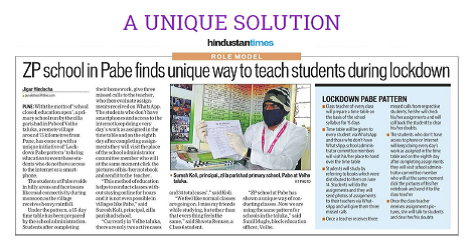
With the motto of ‘school closed; education open’, a primary school run by the zilla parishad in Pabe of Velhe taluka, a remote village around 75 kilometres from Pune, has come up with a unique initiative of ‘Lockdown Pabe pattern’ to bring education to even those students who do not have access to the internet or a smartphone. The students at Pabe reside in hilly areas and face issues like road connectivity during monsoon as the village receives heavy rainfall.
The Lockdown Pabe pattern
- Time table for 15 days is prepared by the school administration.
- Class teacher of every class will prepare a time table on the basis of the school syllabus.
- Time table will be given to every student via WhatsApp and those who don’t have WhatsApp, school administrator committee members will visit his/her place to hand over the time table.
- Students will study by referring to books which were distributed to them on June 14.
- Students will do the assignments and they will send photos of assignments to their teachers via WhatsApp and will give them three missed calls.
- Once a teacher receives three missed calls from respective students, he/she will check his/her assignments and will call back the student to clear his/her doubts. This routine will continue every day till June 30.
- The students who don’t have access to phone or Internet will keep doing every day’s work as assigned in the time table and on the eighth day after completing assignments they will visit school administrator committee member who will at the same moment click the pictures of his/her notebook and send it to the class teacher.
- Once the class teacher receives assignments pictures, at the same moment she/he will check all assignments and will call back the school administrator committee member to talk with students and clear her/his doubts. table and on the eighth day after completing assignments they will visit school administrator committee member who will at the same moment click the pictures of his/her notebook and send it to the class teacher.
- Once the class teacher receives assignments pictures, at the same moment she/he will check all assignments and will call back the school administrator committee member to talk with students and clear her/his doubts.
Last Modified : 8/26/2021
This topic provides information about Block Task F...
The creation of a distinct government agency for t...
This topic provides information about the e-blood ...
This topic provides information about Comprehensiv...
